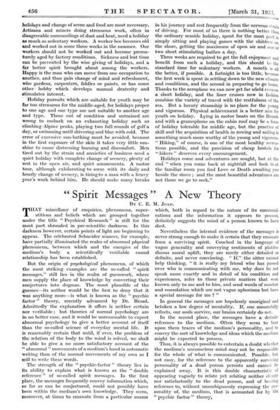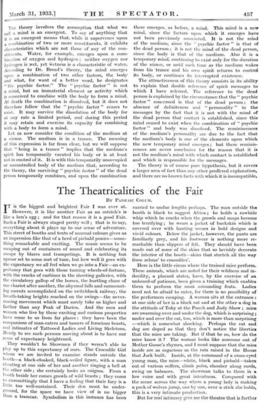" Spirit Messages " A New Theory
By C. E.
M. JOAD.
THAT miscellany of enquiries, phenomena, super- stitions and • beliefs which are grouped together under the title " Psychical Research " is still for the most part shrouded in -pre-scientific darkness. In this darkness however, certain points of light are beginning to appear. The celebrated Schneider seances, for example, have partially illuminated the realm of abnormal physical phenomena, between which and the energies of the medium's body a scientifically 'verifiable causal relationship has been established.
But the origin of psychological phenomena, of which the most striking examples are the so-called " spirit Messages," still lies in the realm of guesswork, where men supply the place of knowledge by converting their conjectures into dogmas. The • most plausible of the guesses—its author would be the first to deny that it was anything more—is what is known as the " psychic factor " theory, recently advanced by Dr. Broad. Admittedly the explanation it offers is neither certain nor verifiable ; but theories of normal psychology are in no better case; and it would be unreasonable to expect abnormal psychology to give a better account of itself than the so-called science of everyday mental life. It is reasonably certain that until, if ever, the problem of the relation of the body to the mind is solved, we shall be able to give a no more satisfactory account of the " abnormal " movements of a medium's hand in automatic writing than of the normal movements of my own as I will to write these words.
• The strength of the " psychic factor " theory lies in its ability to explain what is known as the " double reference " of so-called spirit messages. In the first place, the messages frequently convey information which, so far as can be conjectured, could not possibly have been within the medium's own knowledge. They seem, moreover, at times to emanate from a particular source which, both in regard to the nature of its communi• cations and the information it appears to possess, definitely suggests the mind of a person known to have died.
Nevertheless the internal evidence of the messages is never strong enough to make it certain that they emanate from a surviving spirit. Couched in the language of vague generality and conveying sentiments of platitu- dinous moral uplift, they are rarely either detailed or definite, and never convincing. " If," the sitter cannot help thinking, " it is really- my friend who has passed over who is communicating with me, why does he not speak more exactly and in detail- of his condition and experiences, refer to those private matters that were known only to me and to him, and send words of comfort and consolation which are not vague aphorisms but have a special message for me ?
In general the messages are hopelessly unoriginal and betoken a low degree of mentality. If, one mournfully reflects, our souls survive, our brains certainly do not.
In the second place, the messages have Ec definite reference to the mediuni. Often they seem to bear upon them traces of the medium's personality, and to convey the sort of knowledge and ideas which the medium might be expected to possess.
Thus, it is always possible to entertain a doubt whether the medium's unconscious • mind may not be responsible for the whole of what is communicated. Possible, but not easy, for the reference to the apparently surviving personality of a dead person persists and cannot be explained away. It is this double characteristic of appearing vaguely to relate yet relating neither clearly nor satisfactorily to the dead person, and of bearing reference to, without unambiguously expressing the per- sonality of, the medium, that is accounted for by the psychic factor " theory, The theory involves the assumption that what we call a mind is an emergent. To say of anything that it is an emergent means that, while it supervenes upon a combination of two or more constituents, it exhibits characteristics which are not those of any of the con- stituents. Water, for example, emerges upon a _com- bination of oxygen and hydrogen ; neither oxygen nor hydrogen is >vet, yet wetness is a characteristic of water. According to Dr. Broad's theory; the mind emerges upon a combination of two other factors, the body and what, for want of a better word, he designates " the psychic factor." The " psychic factor " is not a mind, but an immaterial element or activity which is conceived to combine with the body to form a mind. At death the combination is dissolved, but it does not therefore follow that the " psychic factOr " ceases to exist. It may survive the dissolution of the body for at any rate a limited period, and during this period it may retain and exercise its capacity for combining with a body to form a mind.
Let us now consider the condition of the medium at a séance. The medium is in a trance. The meaning of this expression is far from clear, but we will suppose that " being in a trance " implies that the medium's spirit has temporarily vacated his body or is at least not in control of it. It is with this temporarily unoccupied or uncontrolled body of the medium that, according to the theory, the surviving " psychic factor " of the dead person temporarily combines, and upon the combination there emerges, as before, a mind. This mind is a new mind, since the factors upon which it emerges have not been previously associated. It is not the mind of the medium, since the " psychic factor " is that of the dead person ; it is not the mind of the dead person, since the body is that of the medium. Also it is a temporary mind, continuing to exist only for the duration of the séance, or until such time as the medium wakes from his trance and his own spirit returns to control its body, or continues its interrnpted existence.
The attractiveness of this theory consists in its ability to explain that double reference of spirit messages to which I have referred. The reference to the dead person is explained by the circumstance that the " psychic factor " concerned is that of the dead person ; the absence of definiteness and " personality " in the messages by the fact that it is not with the mind of the dead person that contact is established, since this mind ceased to exist when the combination of " psychic factor " and body was dissolved. The reminiscences of the medium's personality are due to the fact that the medium's body is one of the elements upon which the new temporary mind emerges ; but these reminis- cences are never conclusive for the reason that it is not the medium's mind with which contact is established and which is responsible for the messages.
The theory is of course pure hypothesis, but it covers a larger area of fact than any other proffered explanation, and there are no known facts with which it is incompatible,









































 Previous page
Previous page